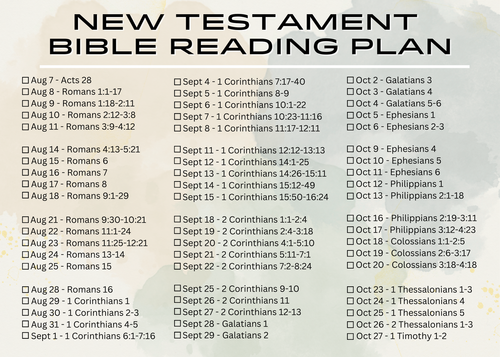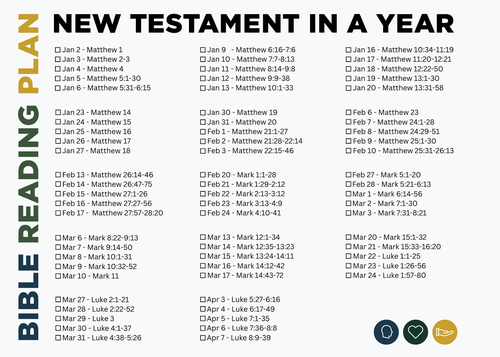Type your new text here.
Acts 17:22-18:17
Athens Apologetics
The Areopagus, situated near the Acropolis, the Parthenon, and the Agora, provides a dramatic backdrop for Paul to proclaim that God does not live in man-made temples. Of all the statues and temples, he focuses on an altar inscribed, “To the unknown god” (v. 23). The “unknown god” of the altar points to their innate knowledge of the divine. Paul asserts that there is one God who made everything that exists; he is the King, the “Lord of heaven and earth” (v. 24). This one God is self-sufficient, needing neither man-made temples nor sacrifices (vv. 24–25). He is personal, providentially ordering the history of the world, including the times and places of all nations (17:26). He needs neither temples nor sacrifices “since” he is the creator of the world and all people, beginning with a single man (vv. 25–26). God, as creator, Lord, and sustainer of the world, has done all this for a particular purpose: “that they should seek God” (v. 27).
The pervasive idolatry in Athens is a sign of an attempt to find God—not specifically an inquisitive or investigative search for the revealed God of the Bible but a search for someone or something divine outside themselves. Not only is it seen in their idols, but it is also found in their literature. Paul quotes two Greek poets (Acts 17:28), the first likely being Epimenides: “In him, we live and move and have our being”; and the second being Aratus: “For we are indeed his offspring.” Readers may wonder whether it is right to quote these Greek poets as Scripture, but when we quote these lines, we are not quoting the poets directly nor affirming anything about their inspiration. We do not quote them; we quote Paul, and in doing so, we quote Scripture. Paul reaches the goal of his address in verses 30–31. The times of acting in ignorance are over. God has not yet judged idolatry, but he will, and now the Athenians know it. Paul’s Gentile audience would have understood that God will judge the world with justice. There is both warning and hope in Paul’s words. Paul’s arguments do not convince everyone, but some, including Dionysius, “the Areopagite,” Damaris, and others, believe (v. 34).
The pervasive idolatry in Athens is a sign of an attempt to find God—not specifically an inquisitive or investigative search for the revealed God of the Bible but a search for someone or something divine outside themselves. Not only is it seen in their idols, but it is also found in their literature. Paul quotes two Greek poets (Acts 17:28), the first likely being Epimenides: “In him, we live and move and have our being”; and the second being Aratus: “For we are indeed his offspring.” Readers may wonder whether it is right to quote these Greek poets as Scripture, but when we quote these lines, we are not quoting the poets directly nor affirming anything about their inspiration. We do not quote them; we quote Paul, and in doing so, we quote Scripture. Paul reaches the goal of his address in verses 30–31. The times of acting in ignorance are over. God has not yet judged idolatry, but he will, and now the Athenians know it. Paul’s Gentile audience would have understood that God will judge the world with justice. There is both warning and hope in Paul’s words. Paul’s arguments do not convince everyone, but some, including Dionysius, “the Areopagite,” Damaris, and others, believe (v. 34).
Aquila And Priscilla
In Corinth, Paul meets Aquila and Priscilla, who have come to Corinth because Emperor Claudius decided to drive the Jews from Rome in AD 49. Following his typical pattern, Paul spends time in the synagogue seeking to convince, based on Scripture, both Jews and God-fearing Greeks to believe in Jesus as the Messiah (18:4). This is followed by a shift to what becomes the typical meeting places for the early church: house churches (v. 7).
As usual in Luke’s story, persecution leads to a change in setting. The increase in Gentile believers also accounts for the movement to house churches. Paul has withstood persecution and attacks on his preaching in virtually every place. Here in Corinth, however, the rejection is such that he not only declares, as he did in Pisidian Antioch (13:46), his turn to the Gentiles but also symbolically condemns their unbelief by shaking out his clothes and declaring, “Your blood be on your own heads!” (18:6). What may seem like a setback immediately bears fruit as Paul moves to the house of Titius Justus. Crispus (the synagogue leader), his household, and many others believe and receive baptism (Acts 18:8). So here with Crispus, the reader of Acts can assume both faith and the Spirit at conversion. Paul is not given a special divine vision regarding who will believe but is encouraged to persevere in Corinth because the Lord’s “people” are there. From what the Lord tells Paul, he may stay and preach with confidence.
Paul’s eighteen months in Corinth end in another uproar. The Jews bring him to the proconsul, Gallio, on charges that he has taught the worship of God that is “contrary to the law” (18:13). The irony is that such a charge reveals that they understand neither Paul nor their law. In this instance, Paul does not even speak. Gallio could not care less about the case and told them to settle their issues themselves. Out of what appears to be pure spite, the Jews grab Sosthenes, the synagogue ruler, and beat him (v. 17). The implication is that Sosthenes, who presumably took over as synagogue ruler after Crispus became a believer, has also become a believer. The Jews beat Sosthenes somewhere within sight of the tribunal—the seat from which Gallio would judge the cases brought before him—but Gallio “paid no attention to any of this” (v. 17).
As usual in Luke’s story, persecution leads to a change in setting. The increase in Gentile believers also accounts for the movement to house churches. Paul has withstood persecution and attacks on his preaching in virtually every place. Here in Corinth, however, the rejection is such that he not only declares, as he did in Pisidian Antioch (13:46), his turn to the Gentiles but also symbolically condemns their unbelief by shaking out his clothes and declaring, “Your blood be on your own heads!” (18:6). What may seem like a setback immediately bears fruit as Paul moves to the house of Titius Justus. Crispus (the synagogue leader), his household, and many others believe and receive baptism (Acts 18:8). So here with Crispus, the reader of Acts can assume both faith and the Spirit at conversion. Paul is not given a special divine vision regarding who will believe but is encouraged to persevere in Corinth because the Lord’s “people” are there. From what the Lord tells Paul, he may stay and preach with confidence.
Paul’s eighteen months in Corinth end in another uproar. The Jews bring him to the proconsul, Gallio, on charges that he has taught the worship of God that is “contrary to the law” (18:13). The irony is that such a charge reveals that they understand neither Paul nor their law. In this instance, Paul does not even speak. Gallio could not care less about the case and told them to settle their issues themselves. Out of what appears to be pure spite, the Jews grab Sosthenes, the synagogue ruler, and beat him (v. 17). The implication is that Sosthenes, who presumably took over as synagogue ruler after Crispus became a believer, has also become a believer. The Jews beat Sosthenes somewhere within sight of the tribunal—the seat from which Gallio would judge the cases brought before him—but Gallio “paid no attention to any of this” (v. 17).





Recent
Archive
2023
January
Happy New Year!He Will Save His People From Their SinsMy Beloved SonTemptation And MinistryThe SermonLeaving, Lying, Limits, Love, Largesse, and The Lord's PrayerTreasure, Anxiety, and JudgmentAstonishing AuthorityStorms, Demons, and HealingJesus Is CompassionateHis Eye Is On The SparrowSwords, Rewards, and MessengersThe Lord of the SabbathBlasphemy, Bad Trees, Signs, and FamilyStories, Sowers, and SoilsParables, Hidden Treasure, and RejectionFame, Food, Fear, Faith, and FringeReal Issues And The Power Of GodDying To Find LifeLike The SunChildren, Temptation, Sheep, And ForgivenessMarriage, Kids, And MoneyTo Serve And Give His Life
February
The ArrivalStories That StingQuestion TrapsHidden Motives And LamentThe End...?UnexpectedReady?Punishment, The Plot, And PerfumeTreachery, Passover, and The CupBetrayal, Injustice, And DenialThe Field Of Blood And The GovernorCrucifixion And DeathAll AuthorityMark—The Beginning Of The GospelHealing, Preaching, And The Forgiveness Of SinEating With Tax Collectors, Fasting, The Sabbath, And An Escape BoatThe Twelve, Blasphemy, Family, And A ParableParables And PowerA Different Kind Of StormPower Had Gone Out
March
Death, Hunger, And MiraclesCommandment Or TraditionDo You Not Yet Understand?The Christ And A Glimpse Of His GloryUnbelief, Confusion, And SinDivorce, Children, And PossessionsTo Give His Life As A RansomHosannaThe Rejected Stone, Taxes, And The Great CommandmentDestruction And The EndNo One Knows, An Anointing, And A Promise To BetrayPassover And GethsemaneThe Kiss, Arrest, And DenialPilate, Simon, And The CrucifixionDeath, Burial, Resurrection, And What\'s NextTheophilus And A Visit From GabrielMary And The MagnificatBenedictusThe Arrival And The ShepherdsSimeon, Anna, And The SpiritFruits Keeping With Repentance And BaptismThe Wilderness, Nazareth, And CapernaumSimon's Mother-In-Law, Fishing, A Leper, And Sins
April
Tax Collectors, Fasting, Sabbath Controversies, And The TwelveWhy Do You Call Me Lord, Lord?Jesus Marveled, A Raised Son, And QuestionsA Sinful Woman And A ParableObeying The Word, A Storm, And DemonsTwelve Years, Twelve Apostles, And SpeculationGreater, Costly, And GloryNot Getting It, The Cost, And AppointedWoes, Neighbors, And What Is NecessaryHelp Us Pray And A Divided Kingdom?Signs, Lights, And WoesHypocrisy, Fear, A Fool, And AnxietyParables, Division, And The TimesWarnings, A Daughter Of Abraham, And Jerusalem, JerusalemA Son Or An Ox, Parties, And DiscipleshipLost ThingsThe Dishonest Manager, The Law, And Anguish In This FlameMillstones And Mustard SeedsPersistent Prayer, Humility, A Childlike Faith, And The Rich RulerEverything That Is Written, A Blind Beggar, And A Wee Little Man
May
A Parable, A Colt, A Prophecy, And A CleansingAuthority, Wicked Tenants, And TaxesThings To Beware Of And WidowsDestruction, Persecution, The Son Of Man, And WatchingThe Plot, Betrayal, Lord's Supper, And Inappropriate BehaviorPrediction, Fulfillment, Agony, Betrayal, And DenialMistreated, Taken Before The Council, Pilate, Herod, And Delivered To Be CrucifiedCrucifixion, Death, And BurialHe Is Not HereDisbelieved For JoyIn The Beginning…The Lamb Of God And A WeddingZeal, What's Inside, And Born AgainHe Must Increase
Categories
no categories
Tags
no tags
